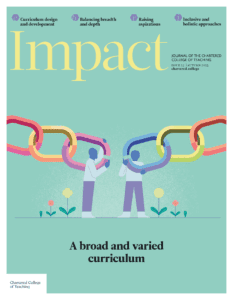STEPHEN CRINALL FCCT, HEAD OF SCHOOL, LALEHAM C OF E PRIMARY SCHOOL, UK
Introduction
In the heart of a diverse and vibrant community surrounding London Heathrow, Bedfont Primary School has embarked on an innovative journey to develop and implement its own Primary School Baccalaureate. This initiative, accredited by the National Baccalaureate Trust, aims to foster a broad and balanced curriculum for Year 5 and 6 pupils, while supporting a smooth transition into secondary education. With pupils from diverse socio-economic and cultural backgrounds, the school has recognised the importance of providing all children with opportunities for meaningful learning beyond the core content of the National Curriculum, preparing them for the next stage of their education. This case study reflects on the design, implementation and initial impact of the Bedfont Baccalaureate and offers insights into its potential and future development.
Context
Bedfont Primary School is a larger-than-average primary school, serving a community where over 50 languages are spoken and 74 per cent of pupils have English as an additional language (EAL). The school is committed to providing an inclusive and flexible curriculum that ensures access to educational opportunities that meet the needs of all, regardless of background, aiming to address the ever-growing disadvantage gap (Hutchinson et al., 2019).
Following a period of significant curriculum realignment, the school introduced the Bedfont Baccalaureate to support child development. This approach ensures that each pupil has access to a spectrum of learning opportunities and is rooted in the belief that a broad and balanced curriculum is essential for deep and meaningful learning (Wiliam, 2013; Ogier and Grigg, 2022).
Design and accreditation process
The Bedfont Baccalaureate is built on a comprehensive, pupil-centred framework that includes core academic content, personal development programmes (PDP) and a personal project. Pupils work towards earning the Bedfont Baccalaureate by completing various projects, participating in extracurricular activities and engaging in experiences that promote their growth as responsible citizens. It was accredited by the National Baccalaureate Trust (2023), a registered charity that promotes policy change and supports grassroots baccalaureate implementation in schools and colleges. The process of accreditation entailed submitting the school’s proposed design, explicitly detailing the various elements that contribute to a balanced and inclusive curriculum and aligning these components with the Baccalaureate framework. This included demonstrating how the curriculum fosters independence, critical thinking and personal growth, while supporting a diverse pupil population and meeting the core principles of the National Baccalaureate.
Core components
The Baccalaureate framework at Bedfont Primary is made up of several key elements, which aim to provide both depth and breadth, ensuring that pupils are well prepared for life beyond primary school.
- Core content: This includes opportunities for hands-on learning in a range of subjects. Among other content, pupils complete practical tasks across science, design and technology, and computing. They also complete geography fieldwork and financial maths tasks and write for a variety of audiences, recognising the balance of skills that pupils will need as they progress to secondary school and then into the world of work.
- Personal development programme (PDP): This programme lies at the heart of the Baccalaureate and focuses on individualised personal growth and development. From analysis of the needs of pupils and the wider community, Bedfont has chosen to base the PDP element on four key groups of activities – leadership skills, outdoor activities, community service and cultural activities. Pupils earn credits towards a 120-point goal by engaging in a range of opportunities, including representing school sports teams, participating in sustainability projects, fulfilling leadership roles within the school and contributing to cultural activities such as choir performances.
- Personal project: The final component of the Bedfont Baccalaureate is the personal project, where pupils explore topics that are relevant to their lives and the school community. Pupils conduct independent research and present their findings in a creative and engaging way. The project is launched in Year 5 and culminates in a celebration of learning in the summer of Year 6, where pupils present their work to parents, staff and stakeholders.
Challenges and opportunities
One of the most noticeable impacts of the Baccalaureate has been the increase in pupil engagement through being encouraged to take ownership of their education. Pupils have expressed enthusiasm for the range of activities available, ranging from educational visits to new leadership opportunities. This is particularly important at a school like Bedfont, where many pupils face challenges such as language barriers or limited support at home. The Baccalaureate provides these pupils with structured yet flexible opportunities to excel in areas they may not otherwise have explored, and has subsequently enabled pupils to develop life skills such as critical thinking, problem-solving and communication.
We’ve received positive feedback from pupils, parents and staff. Pupils report feeling more motivated and inspired by the variety of opportunities provided, particularly the personal project, and parents have praised the initiative for its holistic approach, helping their children to grow in confidence and become more independent. Staff members have also found the Bedfont Baccalaureate to be a valuable tool for enhancing curriculum delivery and fostering deeper learning.
Through the process of embedding the Bedfont Baccalaureate, it has been important to consider the potential challenges presented by this approach to curriculum delivery. Addressing these challenges proactively has been key to ensuring the early success and sustainability of the initiative:
- Workload and buy-in: Introducing a new curriculum framework inevitably contributes to staff workload, particularly during the early stages. To mitigate this, the leadership team prioritised clear communication and involved staff throughout its development. Regular opportunities for feedback and co-designing aspects of the Baccalaureate ensured that staff felt ownership over the process, resulting in strong engagement and a shared sense of purpose.
- Promoting equal access for all: Ensuring equity has been central to the design and delivery of the Bedfont Baccalaureate. All activities are free to access or funded by the school, to prevent financial barriers. Careful planning also ensures that elements of the programme are accessible during the school day rather than being confined to extracurricular clubs or activities with selective entry. This approach guarantees that every child has a fair opportunity to participate and succeed, regardless of their background or circumstances.
While the early stages have been promising, further evaluation will take place once the pilot cohort completes their Baccalaureates in July 2026. This will include a detailed exploration of pupil progress and the long-term impact on their academic and socio-emotional development.
Conclusion
A key strength of the Baccalaureate lies in its adaptability to the specific context of the school community. Schools considering a similar model should begin with a clear understanding of their pupils’ backgrounds, strengths and needs, and then tailor the personal development programmes and personal projects to support the development of key transferable skills. It has also been important to engage staff early in the design process, involve pupils throughout and to celebrate ongoing achievements.
Through its holistic approach, the Baccalaureate supports meaningful learning and real-world readiness. Grounded in clear purpose and embedded within the wider school culture, it has shown early signs of a positive impact on pupil engagement and personal development at our school.











